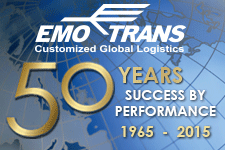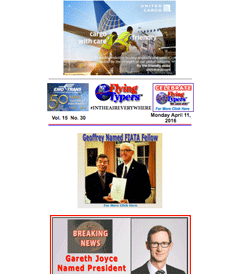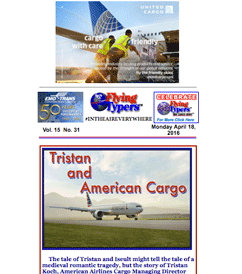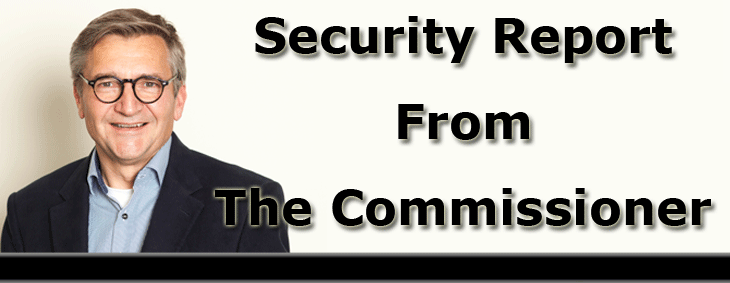
At
CNS in Nashville two weeks ago, the question “What
concerns you most?” was thrown at delegates attending
an early morning session titled “Importance of
Associations In Making Cargo Move.”
Overwhelmingly, the answer
we heard most was “security and safety.”
Although air cargo security
and safety was touched upon briefly at that session
and may have been explored further during the following
two days at CNS, we thought adding an expert voice to
the discussion might help our global readership to join
in the discussion.
So we contacted somebody
that knows more about air cargo security than anybody
on the planet—the always eagle-eyed Harald Zielinski,
Lufthansa Cargo Head of Security & Risk Prevention
Management.
Harald Zielinski has
a strong police background, including time on the street
in Frankfurt (his dad Leo was also a member of the Frankfurt
Police Force). He was already a great cop before he
joined Lufthansa at its cargo headquarters at FRA.
For the past several
years, Harald has held high profile air cargo meetings
to present security issues to large audiences both in
Germany and the U.S.
It’s worth mentioning
that Lufthansa stands alone for its continued effort
in making public the security dialogue.
“Moving forward
is a terrific challenge to everybody,” Harald
Zielinski says.
We think that somebody
should create an industry-wide post and name Harald
as the first “Commissioner of Air Cargo Security.”
“Air cargo security
is starting to show signs of alignment and recognition.
With the adoption of standards by ICAO, outreach of
standards through the EU’s ACC3 regime, and the
further development of mutually recognized programs
by various states, the air cargo supply chain is improving.
However, these standards and measures are continually
challenged. We cannot let industry remain idle and we
must continue to drive innovation with new procedures
and/or technology and refine and strengthen measures
already in place.
“With incidents
such as the ongoing effects of the Metro Jet incident
out of Egypt, pressure will continue to undoubtedly
mount, leading to more changes in the future. While
the secure air cargo supply chain is taking shape and
strengthening with each day that passes, the developing
insider threat will challenge us all. The more recent
incident in Brussels reminds us to remain cautious and
mindful of our surroundings and the unsettling sense
that transportation remains a terrorist target.
Keeping this in mind, we need to continually assess
our risk and associated measures and incorporate changes
that are practical, effective, and non-politically charged.”
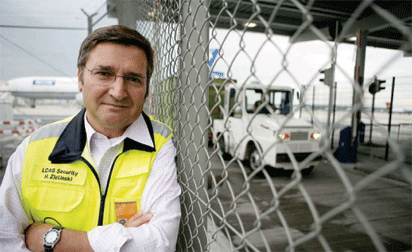 Harald believes that a secure air cargo facility relies
on three things: “people; the proactive development,
continual assessment, and assurance of security measures;
and integrated technology.”
Harald believes that a secure air cargo facility relies
on three things: “people; the proactive development,
continual assessment, and assurance of security measures;
and integrated technology.”
On the technology front,
Harald believes much is moving forward, but there
are certain areas of stagnation.
“X-Ray technology
has remained idle, with few algorithm and software changes.
Trace detection has expanded its reach globally and
changes are improving with an increased library of detection
capabilities and non-radioactive sources, allowing greater
flexibility in relocating units based on operational
demand.
“Canine or Explosives
Detection Dogs remain a small but rather important ‘technology’
that remains underutilized globally in part due to government
approval, availability, or approved standards.
“We expect to see
further growth in the use of EDD to secure air cargo
in the future.
“Lufthansa Cargo
remains in close connection with our partners to ensure
the security controls applied to air cargo remain effective
and consistent. With our global presence in the field,
our assigned area security managers for Germany, EMEA,
Asia, and the Americas ensure the stations remain prepared
and measures are applied in a high standard.
“Rigorous and reliable
audits are critical in order to maintain security measures
in a high standard and to avoid complacency setting
in.
“Our partners share
our commitment to security and our security and operational
management ensure our standards are applied at the level
we expect.”
Looking at the rest of
2016, Harald is optimistic about Lufthansa Cargo’s
upcoming security forum as a means to discuss the current
status of security in air cargo.
“This year, we
are hosting a security conference on May 19th at an
exclusive and eccentric location in downtown Frankfurt.
“We expect to host
an open and honest discussion on the state of security
in our industry, the current and changing threats, the
challenges and successes in the supply chain and the
future outlook. “Our keynote address will
be presented by Mr. Wolfgang Bosbach, member of the
Christian Democratic Union Party and Bundestag Committee
of the Interior. He will provide an overview of the
insider threat and the state of security.”
In terms of what air
cargo can do better as an industry, Harald has a concise
and straightforward list of priorities:
“Many entities,
both public and private, will offer various forms of
security and related services; however, one should only
accept proven security measures.
“[We must] ensure
training and screening standards are applied adequately;
improve awareness (both internal and external); ensure
a quality management system is utilized; and ensure
duplicative security screening measures [as] screening
100 percent by X-Ray is not possible.”
Harald’s greatest
concern for security in air cargo today is “political
interference.”
“We must balance
our objectives and ensure measures are not applied in
a careless and ineffective manner. Governments must
remain in the forefront of providing us insight into
the threat, whereas industry is better suited to define
the vulnerabilities and consequences.”
Geoffrey |
